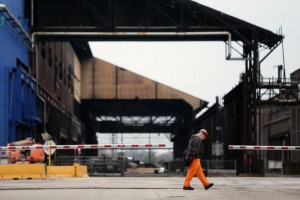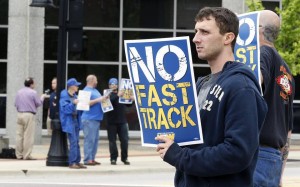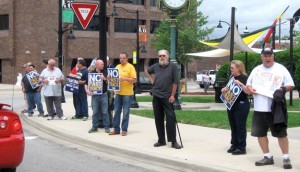
About 80 workers will be laid-off
Granite City, IL – U.S. Steel will not close its Granite City mill as had been expected, a spokesman for U.S. Rep. Mike Bost said Thursday, May 28, 2015. Instead, it will lay off about 80 workers and keep one blast furnace in operation, spokesman Jim Forbes said.
Forbes said Bost’s office was informed of the decision by U.S. Steel, which owns the mill.
The company had planned a temporary shutdown of the entire mill by today, which would have meant laying off about 2,000 workers.
(The following story appears in this week’s Labor Tribune print edition)
Steelworkers rally against ‘Fast Track’ as Congress maneuvers
By CARL GREEN
Illinois Correspondent
Granite City – The reality of an indefinite shutdown of Granite City Steel, scheduled for May 28, was sinking in last week with no signs it might be stopped at the last minute.
The biggest concern seemed to be that nobody knows how long it will last.
U.S. Steel has been hit by a perfect storm of increases in cheap and subsidized imports plus reduced demand caused by low energy prices.
“We’re preparing for a stormy period ahead,” U.S. Steel President Mario Longhi said at the company’s annual meeting. “I really wish I knew how long it was going to last.”
Granite City Mayor Ed Hagnauer said the community is as ready as it can be for the shutdown, which was expected to put 2,080 employees out of work indefinitely.
“We’ve done our homework,” he said in an interview. “We’ve been meeting to try to make sure everything is ready to help those people. We don’t know what we’re dealing with yet.”
The city also has several industrial businesses that supply Granite City Steel, and the effect of the shutdown on them has not yet been seen. “We’re having to prepare for that, too,” Hagnauer said.
The city has been working with SOAR, the Steelworkers retirees’ group, on fundraising events to help the workers get through the shutdown, he said.
Hagnauer believes the city will be able to react more quickly than it did during the last shutdown, in 2008. Job training will be a key effort, he believes, at places such as the Regional Port District, called America’s Central Port.
“We still have things happening,” he said. “We’ve reached out to everyone, and most of them have been responsive.”
“We’re not going to leave them hanging,” he said of the steelworkers. “They’re the backbone of our community. We made it through the last time, and I think we will this time.”
At the plant, work continued on installing a new caster, which makes steel into slabs, giving workers a sign of hope for the plant’s future.
$75 MILLION LOSS
At the annual meeting, held April 28, the company issued a dire first-quarter report with a loss of $75 million, compared to a $52 million gain in the first quarter a year ago.
The company cited cheap imports, the reduced energy market, and $65 million for the cost of shutting down older coke production capacity, including the Granite City facility, which is cutting 176 jobs here.
During the quarter, the flat roll mills operated at 60 percent of capacity, and sales were off 26 percent. Imports claimed 34 percent of the finished steel market.
Local Steelworkers took their battle to the streets as Congress moved ahead with consideration of the Fast Track measure that would give President Obama a six-year authorization that would include approving the Trans-Pacific Partnership trade agreement (TPP), which opponents call “NAFTA on steroids” for the way it could place American workers at a disadvantage.
In a curious political fight between Obama and a coalition of Democrats and unionists, the Senate at first blocked a vote on Fast Track, only to see the proposal advance two days later. On Thursday, May 21, the Senate voted 62-38 to end debate on the Fast Track bill and was considering proposed amendments. The bill had not made it to the House, where it faced an unusual coalition of liberal and far-right representatives, at Labor Tribune press time.
SENDING A MESSAGE

Steelworkers organized an all-labor rally May 18 in downtown Belleville in to send a message to the city’s representative in Congress, Mike Bost, a Republican.
Bost’s staff told the rallying steelworkers that he hadn’t taken a position yet, but events were pushing the decision in his direction, a position Dave Dowling, Sub District 2 director for District 7 of the United Steelworkers, described as “bobbing and weaving and wishy-washiness.”
Dowling said giving any president authority to expedite trade deals was just a bad idea.
“Congress should not vote to hand over its responsibility to debate, consider and amend a trade treaty negotiated by either the current or any future administration,” he said.

Jason Chism, president of USW Local 50 in Granite City, said members of his local are among those that will be out of work soon.
“These jobs are worth fighting for,” Chism said. “The Congressman needs to stand up for the jobs in his jurisdiction.”
One of the issues still being considered was whether the Fast Track bill would include an amendment requiring the U.S. to react against currency manipulation by other nations, which has already cost many jobs here. That protection may also be considered separately.
Obama maintains that his trade policy, which includes Fast Track and the TPP, is not a repeat of NAFTA and would actually do more good than harm, a position strongly opposed by progressive populist Sen. Elizabeth Warren (D-MA), who has become the defacto leader of the opposition to the trade deal.
STATE RESPSONSE
In Springfield, State Rep. Jay Hoffman (D-Swansea) said he is working to pull together resources from state officials and agencies including the Department of Commerce and Economic Opportunity (DCEO).
“A rapid response by DCEO and local officials that connects laid-off workers to support services and job placement programs will be critical to help these laid-off workers’ families,” Hoffman said.
He noted two places where workers can turn for help:
• Madison County Employment and Training, at the Southwestern Illinois Worknet Center, 612 W. St. Louis Ave., East Alton, at (618) 258-7171 or online at mcetd.org.
• AARP Foundation’s Local Workforce Investment Act Center, 3307 Wabash Ave., Suite 6, East Alton, at (618) 876-5258.
Hoffman was also the lead sponsor of a resolution, passed in the House, urging Congress and the President to reconsider tariff and trade policies to protect the steel industry.
Sen. Bill Haine (D-Alton) was sponsoring the measure in the Senate.
“There is one word to describe this – catastrophic,” Haine said. “The closure of this plant would be a tragedy to the families of all these employees, as well as Granite City and the Metro East. I have reached out to Sen. (Dick) Durbin and Gov. (Bruce) Rauner, and I intend on voicing my concerns to the president in an effort to resolve this issue.
“U.S. Steel needs to stay open.”

